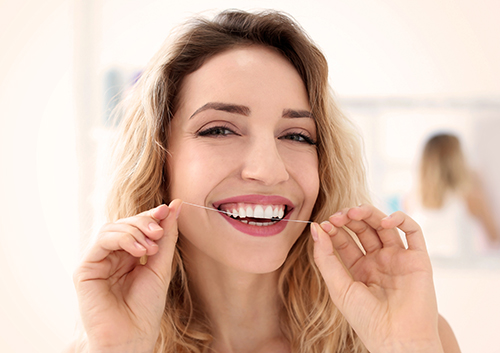Flossing Fixes
May 17th, 2023

A length of floss plus your teeth is about as low-tech as it gets. But, as with so many other “simple” skills, it helps to learn just the right technique to avoid common mistakes and to make your flossing as effective as it can possibly be.
- Choose the Right Floss for You
You’re getting ready to go out, and your floss keeps getting stuck, shredding, or snagging. You might try waxed flosses or flosses treated to glide easily through the teeth if this is a difficulty. (But do call us if it happens a lot—it could be a problem with a restoration, or a cavity, or some other condition we should address.) If you have the opposite problem, too wide a space between teeth for effective flossing, there are dental tape flosses that work with wider spacings. Braces? There are even specially designed dental flosses that thread between brackets and wires to access hard-to-reach plaque and food particles. If you’re unsure which product will work best for you, we have recommendations.
- Don’t Be Too Hard on Yourself
Did you know dental floss is a handy kitchen tool? You can use (unflavored) floss to cut cakes into even layers, slice cheese, or divide a log of cookie dough into perfect rounds. Just pull the floss taut and saw away. But let’s not use this technique on delicate gum tissue! Gums can be injured by a vigorous, sawing motion. Instead, gently guide the floss between the teeth to the gums, and, when you reach the gum line, gently ease the floss up and down the tooth surface. But do remember, sometimes the gums are sore and sensitive because of too little flossing, not too much. Proper cleaning will help keep your gums both healthy and pain-free.
- Technique Counts!
We often use floss to remove food particles from between the teeth, which provides instant dental gratification. But you are flossing for the long term as well. Proper flossing removes the plaque that leads to cavities from places your brush just can’t reach. Make sure you floss between each tooth, and don’t forget the back of those teeth on the end. The next time you visit our Fairview Heights, IL office for a cleaning, let us demonstrate the most effective techniques for gently removing plaque from beneath the gum area and on the tooth’s surface.
- It’s All in the Timing
How much time should you spend flossing? That answer will depend on your individual needs. For some people, thorough and careful flossing once a day will be sufficient. For others, flossing more often might be advisable. We can help you decide how often and how long to floss.
It might take some time and practice to learn to floss effectively, but you will find your technique gets better and your flossing is accomplished more quickly once you have the basics down. If Drs. Rottschalk, Acker, and Froidcoeur can offer any suggestions, don’t hesitate to ask!
Can sealants benefit you?
May 10th, 2023

Molars are difficult to reach when brushing your teeth because they’re full of crevices, caves, and pits that can provide the perfect environment for decay. Sealants are the perfect fix for this.
Sealants are a plastic-like protective solution that bond to the edge of the tooth. The treatment protects you against cavities and could save you from complicated dental issues in the future.
The process for placing sealants is painless and quick. First, Drs. Rottschalk, Acker, and Froidcoeur will clean the tooth with a baking soda spray. An acid etch is applied in order to “roughen up” the surface of the tooth and re-mineralize the area. The area is dried with an alcohol-based liquid and the sealant is placed on the grooves of the tooth. A special light then hardens the liquid into a plastic-like material.
Although sealants can last several years, they need to be examined semi-annually to check for breakage. Any cracks or breaks in your sealant can put your tooth at high risk for decay, and repair of sealants is a quick and painless task.
Children often receive sealants, but people of all ages can benefit from them. Adults who have especially deep canyons on their teeth are good candidates for sealants.
An investment in dental sealants can prevent tooth decay and complicated dental problems later on. It’s a no brainer! Call our Fairview Heights, IL office today to speak with us about getting sealants on your teeth.
Celebrate Your Mom’s Smile with These Mother’s Day Gifts
May 10th, 2023

Mother’s Day is around the corner, and if you’re looking for some different gifting ideas for one of the most important people in your life, we have some suggestions for you. Here are a variety of gifts large and small tailored to your mom’s interests and chosen to support her dental health. After all, that’s what we’re here for!
- The Techie Mom
If your mother hasn’t tried the latest in brushing technology, a new electric toothbrush might be the gift to warm her techie heart.
Modern electric toothbrushes have plenty of options for the tech-savvy. They come with different settings for brushing and massaging. They can let your mom know if she’s brushing long enough, or if she’s brushing too hard, or when the brush head needs to be replaced. Some models link to apps which show a map of just where she’s brushed, in case some spots tend to get overlooked and underbrushed.
- The Adventurous Mom
A week in the woods doesn’t faze her. Backpacking? Relaxing. Day hikes? No problem. So help your mom stay unfazed, unstressed, and problem-free with an emergency dental kit for peace of mind during those adventurous outings.
Lightweight kits are available in sporting stores and online. Supplies like cotton rolls, dental floss, oral pain relievers, a dental mirror, and even temporary fillings are included, because, as your mom no doubt told you, it’s always best to be prepared!
- The Gourmet Mom
For the mom who appreciates foods which both taste good and do good, consider a gourmet gift which can satisfy her palate and contribute to her health. While normally we wouldn’t recommend sugary chocolates as having any kind of health benefit, dark chocolates are the delicious exception to the rule.
Dark chocolate (at least 70% cacao) is a great source of antioxidants, iron, zinc, magnesium and other important minerals. It’s lower in sugar content, and some studies suggest that dark chocolate has cavity-fighting properties and supports gum health. For a personal touch, deliver homemade treats like dark chocolate-covered frozen bananas (low in acidity and filled with nutrients) or dark chocolate-dipped strawberries (a good source of vitamin C, which is great for her gums).
- The Athletic Mom
She can outski you, outrun you, and hit those threes with ease. If your mom finds her bliss on the slopes, the soccer pitch, the basketball court, or any other sporty venue, consider a custom mouthguard to protect that winning smile.
Custom guards are more comfortable than store-bought options because they are molded to fit the user’s teeth and mouth precisely. This is especially helpful for those with dental work like braces or bridges. And, because the fit is custom, your mom will enjoy easier breathing and talking while exercising.
- The Mom on the Go
With her active life, any gift which makes your mom’s busy schedule run more smoothly is a good thing—such as a portable kit filled with dental necessities.
A travel toothbrush, a small tube of her favorite toothpaste, a compact mirror, dental picks, dental floss, and a mini-bottle of mouthwash are great basics for a confident smile any time of day. Put everything in a stylish lightweight travel bag. And don’t forget to include a pack of sugarless gum! Sugarless gum helps increase saliva flow (for better hydration) and decrease oral acidity (to help prevent enamel erosion).
- The Media-Ready Mom
With those perfect selfie angles, your mom’s smiles light up social media! If she’s ever expressed an interest in lightening and brightening that beautiful smile, a professional whitening treatment might be the very gift for her.
Professional whitening at our Fairview Heights, IL office is the most effective way to brighten teeth, with results which are generally faster and more long lasting than over-the-counter treatments. And it’s done with your mom’s dental health in mind, with a checkup to make sure her teeth are in perfect shape before whitening, and with protective measures in place for sensitive mouth and gum tissue.
We hope this list is a helpful starting point for choosing a smile-healthy gift tailored to your mom’s interests. But we can’t close without adding one last gift perfect for every mother. Including a heartfelt letter or card telling her how much she means to you will put a smile on your mom’s face long after Mother’s Day has come and gone!
Symptoms That Could Mean You Need a Root Canal
May 3rd, 2023

Every tooth packs a lot of layers in a very small area. The outer, visible part of our tooth, the crown, is covered in protective enamel, and the lower root area is protected by a similar substance called cementum. Inside these very hard layers is dentin, a hard but more porous tissue which surrounds the pulp. In this central pulp chamber, we have the blood vessels which nourish the tooth and the nerves which send our bodies signals from the tooth. And if one of those signals is persistent tooth pain, you may need a procedure called a root canal.
There are a number of reasons that a tooth may cause you pain, including:
- Fracture—a cracked or broken tooth can allow bacteria to enter the pulp chamber and cause inflammation and infection
- Cavity—an untreated cavity can leave an opening where bacteria can reach the pulp of the tooth, and again lead to infection
- Gum Disease—bacteria can attack from the root area of the tooth if gum disease has become serious
- Injury—an accident or injury to a tooth can damage the nerve or the blood supply which nourishes the pulp
- Abscess—if infection is left untreated, an abscess may form under the root
While a damaged tooth may sometimes be symptom-free, usually there are signs that the pulp has been injured or infected. What symptoms should lead you to give Drs. Rottschalk, Acker, and Froidcoeur a call?
- Persistent pain in the tooth
- Long-lasting sensitivity to heat or cold
- Gum tissue adjacent to the tooth that is sore, red or swollen
- A cracked, broke, darkened or discolored tooth
- A bump on your gums that persists or keeps recurring—this might indicate an abscess
A root canal is performed by a trained dentist or endodontist. After an anesthetic is used to numb the area, the damaged tissue, including pulp, blood vessels and nerves, is removed from the pulp chamber and each root. The inside of the tooth is then cleaned and shaped, and filled and sealed with a temporary filling. The tooth is filled again permanently, usually on a second visit, and might require a crown in order to protect it from further damage.
The most painful part of a root canal is far more often the time spent suffering before the procedure than the procedure itself. Delaying action when a root canal is necessary can lead to infection, abscess, and even tooth loss. If you experience any of the symptoms mentioned above, please give our Fairview Heights, IL office a call!





